2023年中考英语状语从句详细讲义及练习(无答案)
文档属性
| 名称 | 2023年中考英语状语从句详细讲义及练习(无答案) | 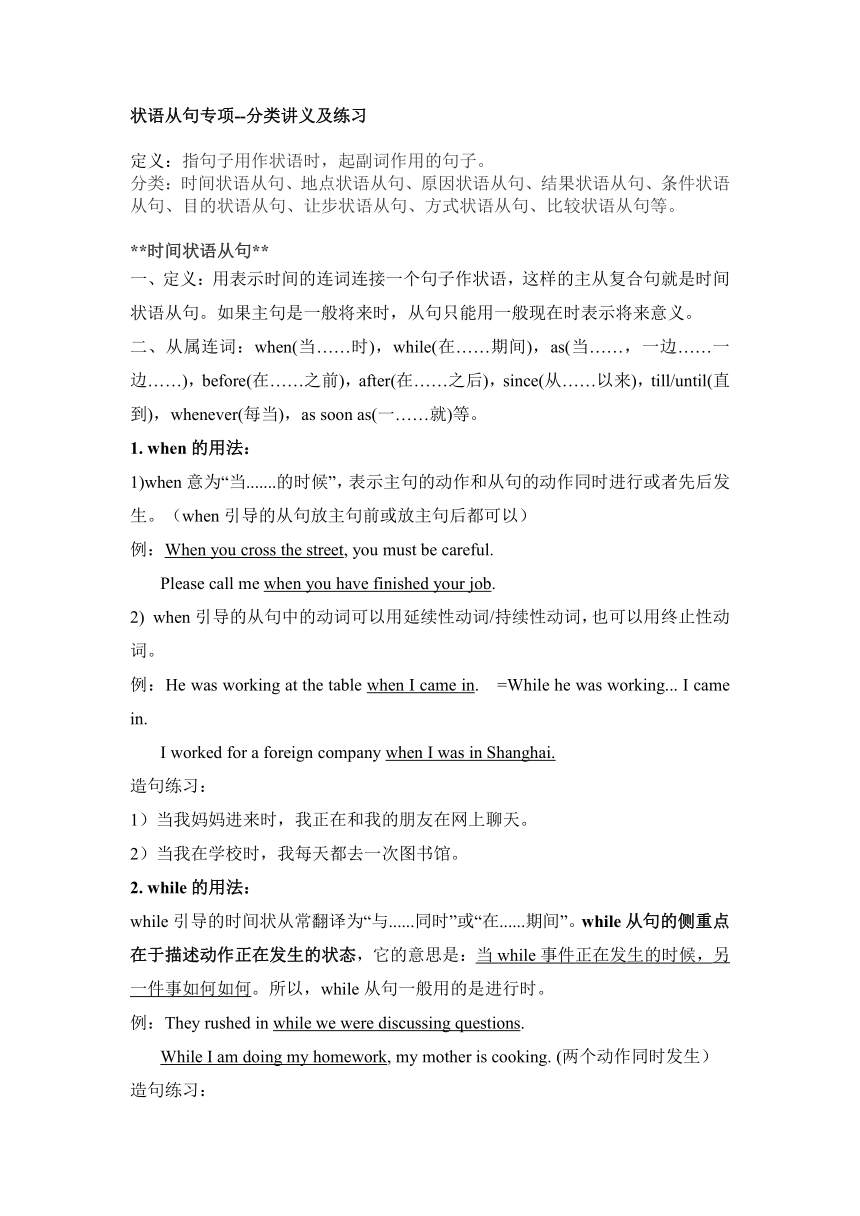 | |
| 格式 | docx | ||
| 文件大小 | 37.9KB | ||
| 资源类型 | 教案 | ||
| 版本资源 | 人教新目标(Go for it)版 | ||
| 科目 | 英语 | ||
| 更新时间 | 2023-02-16 09:34:21 | ||
图片预览

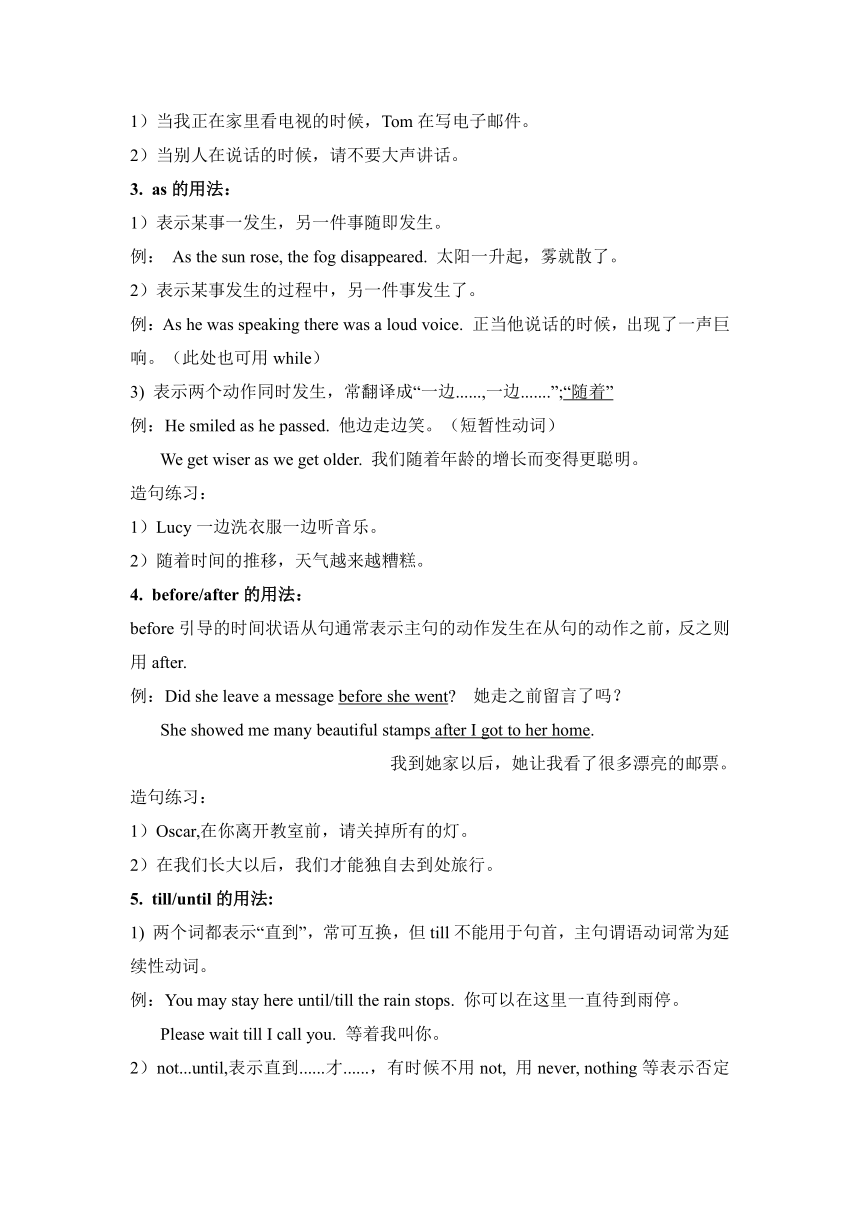
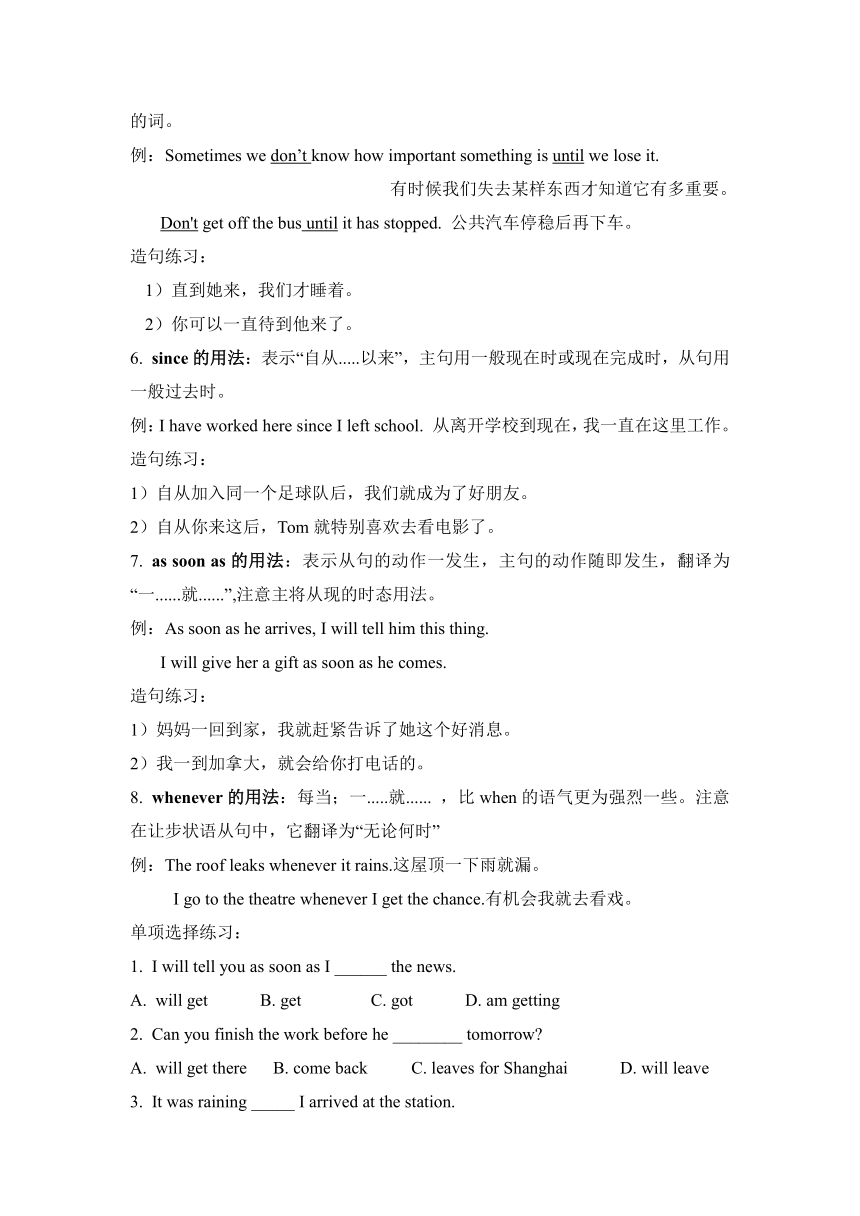
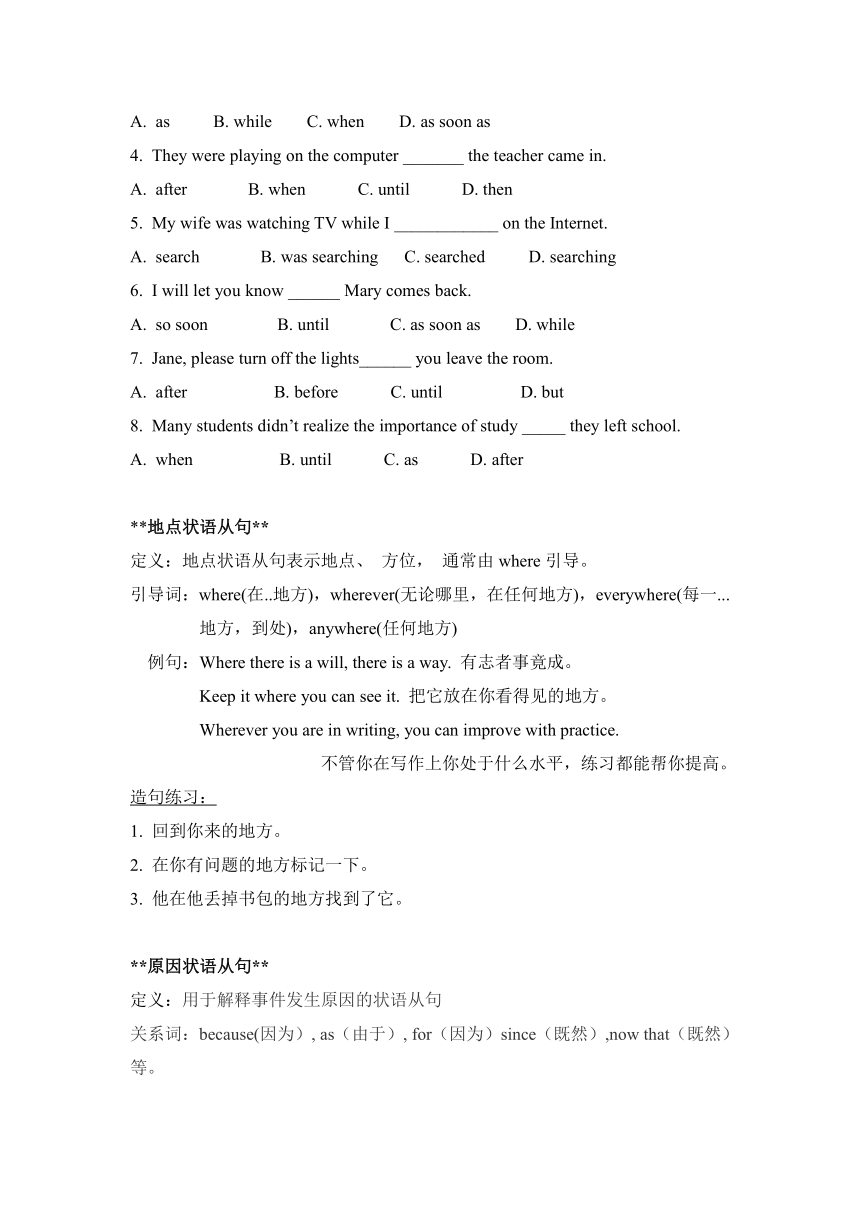
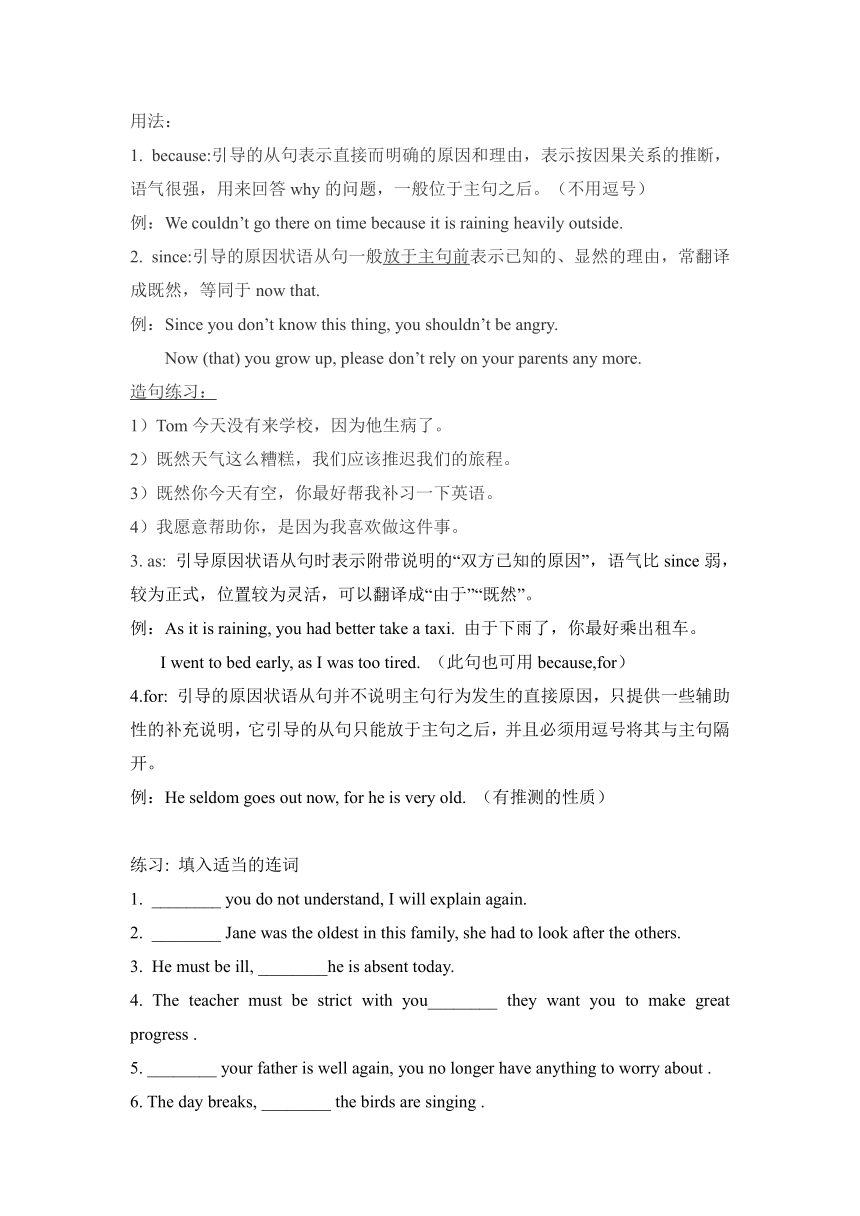
文档简介
状语从句专项--分类讲义及练习
定义:指句子用作状语时,起副词作用的句子。
分类:时间状语从句、地点状语从句、原因状语从句、结果状语从句、条件状语从句、目的状语从句、让步状语从句、方式状语从句、比较状语从句等。
**时间状语从句**
一、定义:用表示时间的连词连接一个句子作状语,这样的主从复合句就是时间状语从句。如果主句是一般将来时,从句只能用一般现在时表示将来意义。
二、从属连词:when(当……时),while(在……期间),as(当……,一边……一边……),before(在……之前),after(在……之后),since(从……以来),till/until(直到),whenever(每当),as soon as(一……就)等。
1. when的用法:
1)when意为“当.......的时候”,表示主句的动作和从句的动作同时进行或者先后发生。(when引导的从句放主句前或放主句后都可以)
例:When you cross the street, you must be careful.
Please call me when you have finished your job.
when引导的从句中的动词可以用延续性动词/持续性动词,也可以用终止性动词。
例:He was working at the table when I came in. =While he was working... I came in.
I worked for a foreign company when I was in Shanghai.
造句练习:
1)当我妈妈进来时,我正在和我的朋友在网上聊天。
2)当我在学校时,我每天都去一次图书馆。
2. while的用法:
while引导的时间状从常翻译为“与......同时”或“在......期间”。while从句的侧重点在于描述动作正在发生的状态,它的意思是:当while事件正在发生的时候,另一件事如何如何。所以,while从句一般用的是进行时。
例:They rushed in while we were discussing questions.
While I am doing my homework, my mother is cooking. (两个动作同时发生)
造句练习:
当我正在家里看电视的时候,Tom在写电子邮件。
当别人在说话的时候,请不要大声讲话。
as的用法:
表示某事一发生,另一件事随即发生。
例: As the sun rose, the fog disappeared. 太阳一升起,雾就散了。
表示某事发生的过程中,另一件事发生了。
例:As he was speaking there was a loud voice. 正当他说话的时候,出现了一声巨响。(此处也可用while)
表示两个动作同时发生,常翻译成“一边......,一边.......”;“随着”
例:He smiled as he passed. 他边走边笑。(短暂性动词)
We get wiser as we get older. 我们随着年龄的增长而变得更聪明。
造句练习:
Lucy一边洗衣服一边听音乐。
随着时间的推移,天气越来越糟糕。
before/after的用法:
before引导的时间状语从句通常表示主句的动作发生在从句的动作之前,反之则用after.
例:Did she leave a message before she went 她走之前留言了吗?
She showed me many beautiful stamps after I got to her home.
我到她家以后,她让我看了很多漂亮的邮票。
造句练习:
Oscar,在你离开教室前,请关掉所有的灯。
在我们长大以后,我们才能独自去到处旅行。
till/until的用法:
两个词都表示“直到”,常可互换,但till不能用于句首,主句谓语动词常为延续性动词。
例:You may stay here until/till the rain stops. 你可以在这里一直待到雨停。
Please wait till I call you. 等着我叫你。
2)not...until,表示直到......才......,有时候不用not, 用never, nothing等表示否定的词。
例:Sometimes we don’t know how important something is until we lose it.
有时候我们失去某样东西才知道它有多重要。
Don't get off the bus until it has stopped. 公共汽车停稳后再下车。
造句练习:
直到她来,我们才睡着。
你可以一直待到他来了。
since的用法:表示“自从.....以来”,主句用一般现在时或现在完成时,从句用一般过去时。
例:I have worked here since I left school. 从离开学校到现在,我一直在这里工作。
造句练习:
自从加入同一个足球队后,我们就成为了好朋友。
自从你来这后,Tom就特别喜欢去看电影了。
as soon as的用法:表示从句的动作一发生,主句的动作随即发生,翻译为“一......就......”,注意主将从现的时态用法。
例:As soon as he arrives, I will tell him this thing.
I will give her a gift as soon as he comes.
造句练习:
妈妈一回到家,我就赶紧告诉了她这个好消息。
我一到加拿大,就会给你打电话的。
whenever的用法:每当;一.....就...... ,比when的语气更为强烈一些。注意在让步状语从句中,它翻译为“无论何时”
例:The roof leaks whenever it rains.这屋顶一下雨就漏。
I go to the theatre whenever I get the chance.有机会我就去看戏。
单项选择练习:
I will tell you as soon as I ______ the news.
will get B. get C. got D. am getting
Can you finish the work before he ________ tomorrow
will get there B. come back C. leaves for Shanghai D. will leave
It was raining _____ I arrived at the station.
as B. while C. when D. as soon as
They were playing on the computer _______ the teacher came in.
after B. when C. until D. then
My wife was watching TV while I ____________ on the Internet.
search B. was searching C. searched D. searching
I will let you know ______ Mary comes back.
so soon B. until C. as soon as D. while
Jane, please turn off the lights______ you leave the room.
after B. before C. until D. but
Many students didn’t realize the importance of study _____ they left school.
when B. until C. as D. after
**地点状语从句**
定义:地点状语从句表示地点、 方位, 通常由where引导。
引导词:where(在..地方),wherever(无论哪里,在任何地方),everywhere(每一...地方,到处),anywhere(任何地方)
例句:Where there is a will, there is a way. 有志者事竟成。
Keep it where you can see it. 把它放在你看得见的地方。
Wherever you are in writing, you can improve with practice.
不管你在写作上你处于什么水平,练习都能帮你提高。
造句练习:
回到你来的地方。
在你有问题的地方标记一下。
他在他丢掉书包的地方找到了它。
**原因状语从句**
定义:用于解释事件发生原因的状语从句
关系词:because(因为), as(由于), for(因为)since(既然),now that(既然)等。
用法:
because:引导的从句表示直接而明确的原因和理由,表示按因果关系的推断,语气很强,用来回答why的问题,一般位于主句之后。(不用逗号)
例:We couldn’t go there on time because it is raining heavily outside.
since:引导的原因状语从句一般放于主句前表示已知的、显然的理由,常翻译成既然,等同于now that.
例:Since you don’t know this thing, you shouldn’t be angry.
Now (that) you grow up, please don’t rely on your parents any more.
造句练习:
1)Tom今天没有来学校,因为他生病了。
2)既然天气这么糟糕,我们应该推迟我们的旅程。
3)既然你今天有空,你最好帮我补习一下英语。
4)我愿意帮助你,是因为我喜欢做这件事。
3. as: 引导原因状语从句时表示附带说明的“双方已知的原因”, 语气比since弱, 较为正式,位置较为灵活,可以翻译成“由于”“既然”。
例:As it is raining, you had better take a taxi. 由于下雨了,你最好乘出租车。
I went to bed early, as I was too tired. (此句也可用because,for)
4.for: 引导的原因状语从句并不说明主句行为发生的直接原因,只提供一些辅助性的补充说明,它引导的从句只能放于主句之后,并且必须用逗号将其与主句隔开。
例:He seldom goes out now, for he is very old. (有推测的性质)
练习: 填入适当的连词
________ you do not understand, I will explain again.
________ Jane was the oldest in this family, she had to look after the others.
He must be ill, ________he is absent today.
4. The teacher must be strict with you________ they want you to make great progress .
5. ________ your father is well again, you no longer have anything to worry about .
6. The day breaks, ________ the birds are singing .
7. ________ you are ill, you ' d better go to see the doctor.
8. ________ she was late for class, she had to say sorry.
**结果状语从句**
定义:就是在句子中作结果状语的句子,一般放在主句之后。
引导词:so that, so… that…, such… that…等
so that 意为“因此,所以,以致于”,是一个固定短语,如果省略that,句子通常为表结果的并列句,有些用法里会省略so,所以要分析具体语境。
例:He got up early so that he caught the first bus. 他起床早,所以赶上了第一班车。
(He got up early,so he caught the first bus.(表示结果的并列句)
Tom worried so that he could not sleep. Tom很担心,所以他无法入睡。
造句练习:
今天天气太冷了,所以我们不用去动物园了。
Tom一天都没有消息了,因此我们都有点担心他。
so...that...,表示“如此...以致于...”,so后面通常接形容词或副词结构。
1) “so + 形容词 + that …”结构
例:It was so hot that they had to stop the match.
天气是如此的热,结果是他们不得不取消了比赛。
2)“so + 副词 + that”结构
例:Tom drove so carelessly that he almost hit the tree.
Tom开车是如此的粗心大意,结果是他差点撞到大树。
3) “so + 限定词 + 名词 + that”结构
例:There was so much homework to do that Tom got tired.
有太多的作业要做,所以Tom感到很累。
造句练习:
阅览室有那么多的故事书,孩子们都不想离开了。
风刮得如此猛烈,以致他几乎是寸步难行。
这部电影太感人了(moved),导致很多人都哭了。
such...that...,也表示“如此...以致于...”such是形容词,修饰名词,所以它的结构一般是:“such (+冠词a/an)(+形容词)+ 名词 + that”。注意many,much前只能用so修饰,不能用such.
例:It was such a hot day that they had to stop the match.
The shop sells such expensive goods that I want to buy nothing in it.
造句练习:
这么好的衬衣,我也想买一件。
他是一个如此坏的家伙,我们根本不相信他。
他们是非常好的老师, 我们对他们极为尊敬。
**目的状语从句**
定义:在复合句中表示主句动作发生目的的状语从句。
引导词:so that, in order that, in case, for fear(that),lest等
so that, 表示“以便”,它引导的从句只能放在主句后。注意结果状语从句和目的状语从句的区别。
例:She burned the letters so that her husband would never read them.
她把信都烧了,这样一来她丈夫就永远看不到了。
I will run slowly so that you can catch me easily. 我慢点跑,以便你能跟上我。
in order that,表示“为了”,通常放在主句后,也可以用in order to表示(目的状语,放主句前或后都可以)
例:He is working hard in order to pass the examination.
=He is working hard in order that he can pass the examination.
为了考试及格,他正在努力学习。
造句练习:
我妈妈打开了窗户,以便于新鲜的空气能够进入房间。
为了赶上第一班公交车,我早上5点钟就起床了。
我们会尽快告诉你们详细的信息,以便于你们早做安排。
in case(以防), for fear that(生怕;以免),lest(免得;唯恐),三组连词/短语的用法类似,有时候它们引导的从句也可用虚拟语气。
例:You’d better take more clothes, in case you have a cold.
你最好多穿点,以防感冒。
I carried a bag of food lest there are no shops around.
以防周围没有商店,我带了一包食物。
He ran home as fast as he can for fear that it rains. 他飞快地往家跑,生怕下雨。
造句练习:
Tom带了很多钱,以防北京的物价太高。(the price of items)
你们最好小点声说话,免得把睡觉的孩子吵醒。
专项练习:
1. He left in ___a hurry ___he forgot to lock the door.
A. such, that B. so, that C. such, as D. so, when
2. You must improve your study method _____ you may make progress in your studies.
A. so as to B. in order to C. so D. in order that
3. You’d better take the map with you__________ you won’t get lost.
A. as long as B. as soon as C. now that D. so that
4. You have to leave now_______ you can get there on time.
A. so that B. as soon as C. because D. if
5. You must work harder and harder _______ you can go to a better college.
A. in order to B. in order that C. that D. so as to
6. The teacher told us______ funny story________ we all laughed.
A. such a, that B. such, that C. so a, that D. so, that
7. The workers work____ hard_____ they don’t have a day off even on the weekend.
A. too, that B. such, that C. so, that D. as, that
8. After working for 4 hours, he was______ tired_______move on.
A. as, as B. too, to C. so that D. not, enough
9. There is_______ much bird food _______ it can last for two months.
A. such, that B. so, that C. such a, that D. so, to
10. ______ the weather is cold, you had better take your coat.
A. In order that B. So that C. In case D. Such that
**条件状语从句**
定义:是指某一件事情实现之后(状语从句中的动作),其它事情(主句中的动作)才能发生。
引导词:if(如果),unless (除非,如果不),on condition (that) 在...条件下,supposing (假如)等。
原则:遵循主将从现原则,即主句是一般将来时态,祈使句或情态动词,有时也能用现在时,从句要用一般现在时。
用法:
if如果,引导的从句放在主句前,或主句后都可以,注意遵循主将从现的原则,主句不能用be going to 结构,用will/shall表示要做的动作。
例: If you fail in the exam,you will let him down. 如果你考试不及格,你会让他失望的。
We will stop playing if it rains. 如果天下雨,我们就不玩了。
If you see him tomorrow, please give this book to him. (主句为祈使句)
注意分析if引导的宾语从句、条件状语从句的区别。
unless 除非,如果不,除非在……的时候,引导的从句放在主句前,或主句后都可以。
例:You will fail to arrive there in time unless you start earlier.
如果你不早点动身,你就不能及时赶到那儿。
Unless it rains,the game will be played.除非下雨,比赛将照常进行。
on condition (that) 在...条件下,引导的条件从句是主句事件发生的前提条件或唯一条件。
例:I can tell you the truth on condition that you promise to keep a secret.
我可以告诉你真相,条件是你答应保密。
supposing 如果,假如,supposing引导的条件从句表示一种假设条件。
例:Supposing it rains,shall we continue the sports meeting
倘若下雨,我们的运动会还要继续举行吗
造句练习:
如果你不快点走,你就会迟到的。
除非你同意我的想法,我才会和你一起去。
你可以去游泳,条件是你不能离河岸(river bank)太远。
假如这件事有什么问题,你要怎么解决?
**让步状语从句**
定义:是指某事在“退一步”的情况下,会怎么样。
引导词:though(虽然),although(虽然),while(尽管,虽然),even if(即使),even though(即使),no matter+疑问词,疑问词+ever(无论...)
用法:
though, although表示"虽然,纵然"之意,这两个连词意思大致相同,在一般情况下可以互换使用。在口语中,though较常使用,although比though正式,二者都可与yet,still连用,但不能与but连用。though引导的从句放在主句前或主句后都可以,although通常用在句首。
例:Though I believe it, yet I must consider. 尽管我相信这一点,但我还得考虑考虑。
Although/Though he is very old, (yet) he is quite strong.
She passed the examination though she had not studied very hard.
even if/even though,都表示即使,尽管,引导的从句放在主句前或主句后都可以,两个短语有时候可以互换,也有用法的不同。
even if 引导的从句是往往是假设性的,相当于汉语的“即使”“纵然”“就算”“哪怕”。
例:Even if it rains tomorrow, we won’t change our plan.
即使明天下雨,我们也决不改变计划。
They’ll stand by you even if you don’t succeed.
即使你不成功,他们也会支持你。
even though 引导的从句内容往往是真实的,主要用于引出不利用于主句情况的信息,相当于汉语的“尽管”“虽然”。
例:He went out even though it was raining. 尽管在下雨,他还是出去了。
Even though it’s hard work, I enjoy it. 虽然工作艰苦,我还是很喜欢。
造句练习:
尽管这次聚会上我谁也不认识,我也玩得很开心。
即使我得一路走着去,我也要走到那里。
虽然他已经非常累了,但他仍然继续工作。
尽管我相信这件事,但我的朋友不认为这是真的。
While,意为“尽管”“虽然”,跟though/although用法基本相同,但while通常只放句首。
例:While the work was difficult, it was interesting. 虽然工作有难度,但很有趣。
no matter+疑问词=疑问词-ever,含义为"……都……;不管……都……"
no matter what = whatever 无论什么 no matter who = whoever 无论谁
no matter when = whenever 无论何时 no matter where = wherever 无论何地
no matter how = however 无论怎么样
注意:“no matter+疑问词"结构只能引导让步状语从句,而"疑问词-ever"还可以引导名词性从句。
例:No matter what happened, he would not mind.
=Whatever happened, he would not mind.
无论发生了什么事情,他都不会介意的。
No matter who you are, you must keep the law.
=Whoever you are, you must keep the law. 不管你是谁,你都需要遵纪守法。
**状语从句专项综合练习**:
Tom will come to see us _____ he is free tomorrow.
if B. until C. while D. as
It was so hot last night_____ we couldn’t sleep well.
that B. until C. while D. if
______ we were singing happily, he came in.
As soon as B. Until C. While D. After
I _______to bed until my grandpa came back home.
didn’t go B. went C. had gone D. have gone
I don’t know if he ________ tomorrow. If he _____, I well see him off.
will leave, leaves B. leaves, leaves C. will leave, will leave D. leaves, will leave
I’m _____ busy getting ready for Christmas _____ I have no tine to write to you.
not, until B. too,to C.so, that D. such, that
The old man put on his glasses_____ see better.
that B. so that he C. in order that D. in order to
You can have these books ________ I finish reading them.
so that B. unless C. while D. as soon as
________ it was blowing hard, they went to working in the fields.
Since B. Because C. Since D. Though
I didn’t know any English_____ I came here.
before B. for C. while D. since
There are ________ in this room than in that one.
much seats B. more seats C. most seats D. as many as
Young people love this time of year_____ it is good for sport.
when B. for C. so D. while
It is _______ a heavy box ________nobody can move it away.
as, as B. so, that C. such, that D. so,as
______ you start too late, you can’t see those beautiful birds.
If B. Until C. While D. As
_____ he got out of the car, he was given some flowers.
Until B. As soon as C. If D. Before
Tom and I will go climbing if it _____ tomorrow.
won’t snow B. doesn’t snow C. isn’t snow D. can’t snow
Tom can’t go to do it because he ______ an important meeting.
was having B. is having C. would have D. had
Ann has been so busy these days________ she has no time to play with her friends.
when B. until C. that D. as
They talked and talked _____ they got to the end of the road.
then B. until C. while D. after
Mr. Green is _______ looks.
not so old as he B. not as old as I C. more old than he D. much old that he
Please call me to make an appointment this evening, or ____ it is convenient to you.
whenever B. however C. whichever D. whatever
He had his camera ready_____ he saw something that would make a good picture.
even if B. if only C. in case D. so that
_____ you find either his address or his telephone number, you can’t get in touch with him.
Although B. Because C. While D. If
We will not give up______we shall fail ten times.
even if B. until C. though D. as
_____ difficult the task may be, we will try our best to finish it.
No matter B. No wonder C. Though D. However
Mary spends a lot of money on clothes____ her family is not rich.
if B. because C. though D. as
______ we gave his something to eat, he would save it up for his mother.
Whatever B. However C. Whenever D. Whichever
I enjoy learning English, _____ it takes me a lot time.
as if B. though C. because D. as
_____ he is a child, _____ he knows much about the computer.
Though, / B. Although, but C. Because, so D. Though, but
The football match went on, ______ it rained heavily last night.
if B. until C. though D. so
定义:指句子用作状语时,起副词作用的句子。
分类:时间状语从句、地点状语从句、原因状语从句、结果状语从句、条件状语从句、目的状语从句、让步状语从句、方式状语从句、比较状语从句等。
**时间状语从句**
一、定义:用表示时间的连词连接一个句子作状语,这样的主从复合句就是时间状语从句。如果主句是一般将来时,从句只能用一般现在时表示将来意义。
二、从属连词:when(当……时),while(在……期间),as(当……,一边……一边……),before(在……之前),after(在……之后),since(从……以来),till/until(直到),whenever(每当),as soon as(一……就)等。
1. when的用法:
1)when意为“当.......的时候”,表示主句的动作和从句的动作同时进行或者先后发生。(when引导的从句放主句前或放主句后都可以)
例:When you cross the street, you must be careful.
Please call me when you have finished your job.
when引导的从句中的动词可以用延续性动词/持续性动词,也可以用终止性动词。
例:He was working at the table when I came in. =While he was working... I came in.
I worked for a foreign company when I was in Shanghai.
造句练习:
1)当我妈妈进来时,我正在和我的朋友在网上聊天。
2)当我在学校时,我每天都去一次图书馆。
2. while的用法:
while引导的时间状从常翻译为“与......同时”或“在......期间”。while从句的侧重点在于描述动作正在发生的状态,它的意思是:当while事件正在发生的时候,另一件事如何如何。所以,while从句一般用的是进行时。
例:They rushed in while we were discussing questions.
While I am doing my homework, my mother is cooking. (两个动作同时发生)
造句练习:
当我正在家里看电视的时候,Tom在写电子邮件。
当别人在说话的时候,请不要大声讲话。
as的用法:
表示某事一发生,另一件事随即发生。
例: As the sun rose, the fog disappeared. 太阳一升起,雾就散了。
表示某事发生的过程中,另一件事发生了。
例:As he was speaking there was a loud voice. 正当他说话的时候,出现了一声巨响。(此处也可用while)
表示两个动作同时发生,常翻译成“一边......,一边.......”;“随着”
例:He smiled as he passed. 他边走边笑。(短暂性动词)
We get wiser as we get older. 我们随着年龄的增长而变得更聪明。
造句练习:
Lucy一边洗衣服一边听音乐。
随着时间的推移,天气越来越糟糕。
before/after的用法:
before引导的时间状语从句通常表示主句的动作发生在从句的动作之前,反之则用after.
例:Did she leave a message before she went 她走之前留言了吗?
She showed me many beautiful stamps after I got to her home.
我到她家以后,她让我看了很多漂亮的邮票。
造句练习:
Oscar,在你离开教室前,请关掉所有的灯。
在我们长大以后,我们才能独自去到处旅行。
till/until的用法:
两个词都表示“直到”,常可互换,但till不能用于句首,主句谓语动词常为延续性动词。
例:You may stay here until/till the rain stops. 你可以在这里一直待到雨停。
Please wait till I call you. 等着我叫你。
2)not...until,表示直到......才......,有时候不用not, 用never, nothing等表示否定的词。
例:Sometimes we don’t know how important something is until we lose it.
有时候我们失去某样东西才知道它有多重要。
Don't get off the bus until it has stopped. 公共汽车停稳后再下车。
造句练习:
直到她来,我们才睡着。
你可以一直待到他来了。
since的用法:表示“自从.....以来”,主句用一般现在时或现在完成时,从句用一般过去时。
例:I have worked here since I left school. 从离开学校到现在,我一直在这里工作。
造句练习:
自从加入同一个足球队后,我们就成为了好朋友。
自从你来这后,Tom就特别喜欢去看电影了。
as soon as的用法:表示从句的动作一发生,主句的动作随即发生,翻译为“一......就......”,注意主将从现的时态用法。
例:As soon as he arrives, I will tell him this thing.
I will give her a gift as soon as he comes.
造句练习:
妈妈一回到家,我就赶紧告诉了她这个好消息。
我一到加拿大,就会给你打电话的。
whenever的用法:每当;一.....就...... ,比when的语气更为强烈一些。注意在让步状语从句中,它翻译为“无论何时”
例:The roof leaks whenever it rains.这屋顶一下雨就漏。
I go to the theatre whenever I get the chance.有机会我就去看戏。
单项选择练习:
I will tell you as soon as I ______ the news.
will get B. get C. got D. am getting
Can you finish the work before he ________ tomorrow
will get there B. come back C. leaves for Shanghai D. will leave
It was raining _____ I arrived at the station.
as B. while C. when D. as soon as
They were playing on the computer _______ the teacher came in.
after B. when C. until D. then
My wife was watching TV while I ____________ on the Internet.
search B. was searching C. searched D. searching
I will let you know ______ Mary comes back.
so soon B. until C. as soon as D. while
Jane, please turn off the lights______ you leave the room.
after B. before C. until D. but
Many students didn’t realize the importance of study _____ they left school.
when B. until C. as D. after
**地点状语从句**
定义:地点状语从句表示地点、 方位, 通常由where引导。
引导词:where(在..地方),wherever(无论哪里,在任何地方),everywhere(每一...地方,到处),anywhere(任何地方)
例句:Where there is a will, there is a way. 有志者事竟成。
Keep it where you can see it. 把它放在你看得见的地方。
Wherever you are in writing, you can improve with practice.
不管你在写作上你处于什么水平,练习都能帮你提高。
造句练习:
回到你来的地方。
在你有问题的地方标记一下。
他在他丢掉书包的地方找到了它。
**原因状语从句**
定义:用于解释事件发生原因的状语从句
关系词:because(因为), as(由于), for(因为)since(既然),now that(既然)等。
用法:
because:引导的从句表示直接而明确的原因和理由,表示按因果关系的推断,语气很强,用来回答why的问题,一般位于主句之后。(不用逗号)
例:We couldn’t go there on time because it is raining heavily outside.
since:引导的原因状语从句一般放于主句前表示已知的、显然的理由,常翻译成既然,等同于now that.
例:Since you don’t know this thing, you shouldn’t be angry.
Now (that) you grow up, please don’t rely on your parents any more.
造句练习:
1)Tom今天没有来学校,因为他生病了。
2)既然天气这么糟糕,我们应该推迟我们的旅程。
3)既然你今天有空,你最好帮我补习一下英语。
4)我愿意帮助你,是因为我喜欢做这件事。
3. as: 引导原因状语从句时表示附带说明的“双方已知的原因”, 语气比since弱, 较为正式,位置较为灵活,可以翻译成“由于”“既然”。
例:As it is raining, you had better take a taxi. 由于下雨了,你最好乘出租车。
I went to bed early, as I was too tired. (此句也可用because,for)
4.for: 引导的原因状语从句并不说明主句行为发生的直接原因,只提供一些辅助性的补充说明,它引导的从句只能放于主句之后,并且必须用逗号将其与主句隔开。
例:He seldom goes out now, for he is very old. (有推测的性质)
练习: 填入适当的连词
________ you do not understand, I will explain again.
________ Jane was the oldest in this family, she had to look after the others.
He must be ill, ________he is absent today.
4. The teacher must be strict with you________ they want you to make great progress .
5. ________ your father is well again, you no longer have anything to worry about .
6. The day breaks, ________ the birds are singing .
7. ________ you are ill, you ' d better go to see the doctor.
8. ________ she was late for class, she had to say sorry.
**结果状语从句**
定义:就是在句子中作结果状语的句子,一般放在主句之后。
引导词:so that, so… that…, such… that…等
so that 意为“因此,所以,以致于”,是一个固定短语,如果省略that,句子通常为表结果的并列句,有些用法里会省略so,所以要分析具体语境。
例:He got up early so that he caught the first bus. 他起床早,所以赶上了第一班车。
(He got up early,so he caught the first bus.(表示结果的并列句)
Tom worried so that he could not sleep. Tom很担心,所以他无法入睡。
造句练习:
今天天气太冷了,所以我们不用去动物园了。
Tom一天都没有消息了,因此我们都有点担心他。
so...that...,表示“如此...以致于...”,so后面通常接形容词或副词结构。
1) “so + 形容词 + that …”结构
例:It was so hot that they had to stop the match.
天气是如此的热,结果是他们不得不取消了比赛。
2)“so + 副词 + that”结构
例:Tom drove so carelessly that he almost hit the tree.
Tom开车是如此的粗心大意,结果是他差点撞到大树。
3) “so + 限定词 + 名词 + that”结构
例:There was so much homework to do that Tom got tired.
有太多的作业要做,所以Tom感到很累。
造句练习:
阅览室有那么多的故事书,孩子们都不想离开了。
风刮得如此猛烈,以致他几乎是寸步难行。
这部电影太感人了(moved),导致很多人都哭了。
such...that...,也表示“如此...以致于...”such是形容词,修饰名词,所以它的结构一般是:“such (+冠词a/an)(+形容词)+ 名词 + that”。注意many,much前只能用so修饰,不能用such.
例:It was such a hot day that they had to stop the match.
The shop sells such expensive goods that I want to buy nothing in it.
造句练习:
这么好的衬衣,我也想买一件。
他是一个如此坏的家伙,我们根本不相信他。
他们是非常好的老师, 我们对他们极为尊敬。
**目的状语从句**
定义:在复合句中表示主句动作发生目的的状语从句。
引导词:so that, in order that, in case, for fear(that),lest等
so that, 表示“以便”,它引导的从句只能放在主句后。注意结果状语从句和目的状语从句的区别。
例:She burned the letters so that her husband would never read them.
她把信都烧了,这样一来她丈夫就永远看不到了。
I will run slowly so that you can catch me easily. 我慢点跑,以便你能跟上我。
in order that,表示“为了”,通常放在主句后,也可以用in order to表示(目的状语,放主句前或后都可以)
例:He is working hard in order to pass the examination.
=He is working hard in order that he can pass the examination.
为了考试及格,他正在努力学习。
造句练习:
我妈妈打开了窗户,以便于新鲜的空气能够进入房间。
为了赶上第一班公交车,我早上5点钟就起床了。
我们会尽快告诉你们详细的信息,以便于你们早做安排。
in case(以防), for fear that(生怕;以免),lest(免得;唯恐),三组连词/短语的用法类似,有时候它们引导的从句也可用虚拟语气。
例:You’d better take more clothes, in case you have a cold.
你最好多穿点,以防感冒。
I carried a bag of food lest there are no shops around.
以防周围没有商店,我带了一包食物。
He ran home as fast as he can for fear that it rains. 他飞快地往家跑,生怕下雨。
造句练习:
Tom带了很多钱,以防北京的物价太高。(the price of items)
你们最好小点声说话,免得把睡觉的孩子吵醒。
专项练习:
1. He left in ___a hurry ___he forgot to lock the door.
A. such, that B. so, that C. such, as D. so, when
2. You must improve your study method _____ you may make progress in your studies.
A. so as to B. in order to C. so D. in order that
3. You’d better take the map with you__________ you won’t get lost.
A. as long as B. as soon as C. now that D. so that
4. You have to leave now_______ you can get there on time.
A. so that B. as soon as C. because D. if
5. You must work harder and harder _______ you can go to a better college.
A. in order to B. in order that C. that D. so as to
6. The teacher told us______ funny story________ we all laughed.
A. such a, that B. such, that C. so a, that D. so, that
7. The workers work____ hard_____ they don’t have a day off even on the weekend.
A. too, that B. such, that C. so, that D. as, that
8. After working for 4 hours, he was______ tired_______move on.
A. as, as B. too, to C. so that D. not, enough
9. There is_______ much bird food _______ it can last for two months.
A. such, that B. so, that C. such a, that D. so, to
10. ______ the weather is cold, you had better take your coat.
A. In order that B. So that C. In case D. Such that
**条件状语从句**
定义:是指某一件事情实现之后(状语从句中的动作),其它事情(主句中的动作)才能发生。
引导词:if(如果),unless (除非,如果不),on condition (that) 在...条件下,supposing (假如)等。
原则:遵循主将从现原则,即主句是一般将来时态,祈使句或情态动词,有时也能用现在时,从句要用一般现在时。
用法:
if如果,引导的从句放在主句前,或主句后都可以,注意遵循主将从现的原则,主句不能用be going to 结构,用will/shall表示要做的动作。
例: If you fail in the exam,you will let him down. 如果你考试不及格,你会让他失望的。
We will stop playing if it rains. 如果天下雨,我们就不玩了。
If you see him tomorrow, please give this book to him. (主句为祈使句)
注意分析if引导的宾语从句、条件状语从句的区别。
unless 除非,如果不,除非在……的时候,引导的从句放在主句前,或主句后都可以。
例:You will fail to arrive there in time unless you start earlier.
如果你不早点动身,你就不能及时赶到那儿。
Unless it rains,the game will be played.除非下雨,比赛将照常进行。
on condition (that) 在...条件下,引导的条件从句是主句事件发生的前提条件或唯一条件。
例:I can tell you the truth on condition that you promise to keep a secret.
我可以告诉你真相,条件是你答应保密。
supposing 如果,假如,supposing引导的条件从句表示一种假设条件。
例:Supposing it rains,shall we continue the sports meeting
倘若下雨,我们的运动会还要继续举行吗
造句练习:
如果你不快点走,你就会迟到的。
除非你同意我的想法,我才会和你一起去。
你可以去游泳,条件是你不能离河岸(river bank)太远。
假如这件事有什么问题,你要怎么解决?
**让步状语从句**
定义:是指某事在“退一步”的情况下,会怎么样。
引导词:though(虽然),although(虽然),while(尽管,虽然),even if(即使),even though(即使),no matter+疑问词,疑问词+ever(无论...)
用法:
though, although表示"虽然,纵然"之意,这两个连词意思大致相同,在一般情况下可以互换使用。在口语中,though较常使用,although比though正式,二者都可与yet,still连用,但不能与but连用。though引导的从句放在主句前或主句后都可以,although通常用在句首。
例:Though I believe it, yet I must consider. 尽管我相信这一点,但我还得考虑考虑。
Although/Though he is very old, (yet) he is quite strong.
She passed the examination though she had not studied very hard.
even if/even though,都表示即使,尽管,引导的从句放在主句前或主句后都可以,两个短语有时候可以互换,也有用法的不同。
even if 引导的从句是往往是假设性的,相当于汉语的“即使”“纵然”“就算”“哪怕”。
例:Even if it rains tomorrow, we won’t change our plan.
即使明天下雨,我们也决不改变计划。
They’ll stand by you even if you don’t succeed.
即使你不成功,他们也会支持你。
even though 引导的从句内容往往是真实的,主要用于引出不利用于主句情况的信息,相当于汉语的“尽管”“虽然”。
例:He went out even though it was raining. 尽管在下雨,他还是出去了。
Even though it’s hard work, I enjoy it. 虽然工作艰苦,我还是很喜欢。
造句练习:
尽管这次聚会上我谁也不认识,我也玩得很开心。
即使我得一路走着去,我也要走到那里。
虽然他已经非常累了,但他仍然继续工作。
尽管我相信这件事,但我的朋友不认为这是真的。
While,意为“尽管”“虽然”,跟though/although用法基本相同,但while通常只放句首。
例:While the work was difficult, it was interesting. 虽然工作有难度,但很有趣。
no matter+疑问词=疑问词-ever,含义为"……都……;不管……都……"
no matter what = whatever 无论什么 no matter who = whoever 无论谁
no matter when = whenever 无论何时 no matter where = wherever 无论何地
no matter how = however 无论怎么样
注意:“no matter+疑问词"结构只能引导让步状语从句,而"疑问词-ever"还可以引导名词性从句。
例:No matter what happened, he would not mind.
=Whatever happened, he would not mind.
无论发生了什么事情,他都不会介意的。
No matter who you are, you must keep the law.
=Whoever you are, you must keep the law. 不管你是谁,你都需要遵纪守法。
**状语从句专项综合练习**:
Tom will come to see us _____ he is free tomorrow.
if B. until C. while D. as
It was so hot last night_____ we couldn’t sleep well.
that B. until C. while D. if
______ we were singing happily, he came in.
As soon as B. Until C. While D. After
I _______to bed until my grandpa came back home.
didn’t go B. went C. had gone D. have gone
I don’t know if he ________ tomorrow. If he _____, I well see him off.
will leave, leaves B. leaves, leaves C. will leave, will leave D. leaves, will leave
I’m _____ busy getting ready for Christmas _____ I have no tine to write to you.
not, until B. too,to C.so, that D. such, that
The old man put on his glasses_____ see better.
that B. so that he C. in order that D. in order to
You can have these books ________ I finish reading them.
so that B. unless C. while D. as soon as
________ it was blowing hard, they went to working in the fields.
Since B. Because C. Since D. Though
I didn’t know any English_____ I came here.
before B. for C. while D. since
There are ________ in this room than in that one.
much seats B. more seats C. most seats D. as many as
Young people love this time of year_____ it is good for sport.
when B. for C. so D. while
It is _______ a heavy box ________nobody can move it away.
as, as B. so, that C. such, that D. so,as
______ you start too late, you can’t see those beautiful birds.
If B. Until C. While D. As
_____ he got out of the car, he was given some flowers.
Until B. As soon as C. If D. Before
Tom and I will go climbing if it _____ tomorrow.
won’t snow B. doesn’t snow C. isn’t snow D. can’t snow
Tom can’t go to do it because he ______ an important meeting.
was having B. is having C. would have D. had
Ann has been so busy these days________ she has no time to play with her friends.
when B. until C. that D. as
They talked and talked _____ they got to the end of the road.
then B. until C. while D. after
Mr. Green is _______ looks.
not so old as he B. not as old as I C. more old than he D. much old that he
Please call me to make an appointment this evening, or ____ it is convenient to you.
whenever B. however C. whichever D. whatever
He had his camera ready_____ he saw something that would make a good picture.
even if B. if only C. in case D. so that
_____ you find either his address or his telephone number, you can’t get in touch with him.
Although B. Because C. While D. If
We will not give up______we shall fail ten times.
even if B. until C. though D. as
_____ difficult the task may be, we will try our best to finish it.
No matter B. No wonder C. Though D. However
Mary spends a lot of money on clothes____ her family is not rich.
if B. because C. though D. as
______ we gave his something to eat, he would save it up for his mother.
Whatever B. However C. Whenever D. Whichever
I enjoy learning English, _____ it takes me a lot time.
as if B. though C. because D. as
_____ he is a child, _____ he knows much about the computer.
Though, / B. Although, but C. Because, so D. Though, but
The football match went on, ______ it rained heavily last night.
if B. until C. though D. so
同课章节目录
- 词法
- 名词
- 动词和动词短语
- 动词语态
- 动词时态
- 助动词和情态动词
- 非谓语动词
- 冠词
- 代词
- 数词和量词
- 形容词副词及其比较等级
- 介词和介词短语
- 连词和感叹词
- 构词法
- 相似、相近词比较
- 句法
- 陈述句
- 一般疑问句和否定疑问句
- 特殊疑问句及选择疑问句
- 反意疑问句
- 存在句(There be句型)
- 宾语从句
- 定语从句
- 状语从句
- 主谓一致问题
- 简单句
- 并列句
- 复合句
- 主谓一致
- 主、表语从句
- 名词性从句
- 直接引语和间接引语
- 虚拟语气
- 感叹句
- 强调句
- 倒装句
- 祈使句
- 句子的成分
- 句子的分类
- 题型专区
- 单项选择部分
- 易错题
- 完形填空
- 阅读理解
- 词汇练习
- 听说训练
- 句型转换
- 补全对话
- 短文改错
- 翻译
- 书面表达
- 任务型阅读
- 语法填空
- 其他资料
